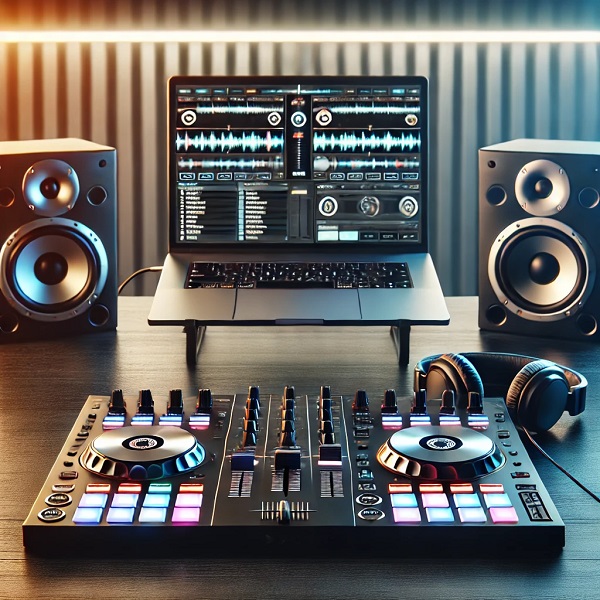DJing is a popular hobby and profession that attracts enthusiasts of all levels. Whether you’re just starting or looking to upgrade your setup, understanding DJ equipment is crucial. This article explores the top questions people ask about DJ equipment, providing clear and concise answers to help you make informed decisions.
What Equipment Do You Need to Start DJing?
Essential Gear for Beginners
Starting as a DJ requires a few essential pieces of equipment. At a minimum, you’ll need:
- DJ Controller: A device that combines a mixer and two decks, allowing you to control music and effects.
- Laptop or Computer: Used to run DJ software where your music library is stored and managed.
- DJ Software: Programs like Serato, Traktor, or Virtual DJ help mix tracks and manage playlists.
- Headphones: High-quality headphones are crucial for cueing tracks and beatmatching.
- Speakers: Active or powered speakers that deliver clear sound for live performances or practice sessions.
How Much Does DJ Equipment Cost?
Budgeting for Your DJ Setup
The cost of DJ equipment can vary widely depending on the brand, features, and quality. For beginners, a basic setup including a controller, headphones, and speakers can range from $500 to $1,000. Mid-range gear suitable for more serious DJs might cost between $1,000 and $2,500, while professional setups can exceed $5,000.
What Are the Best DJ Controllers for Beginners?
Top Picks for New DJs
Several DJ controllers are highly recommended for beginners due to their ease of use and affordability:
- Pioneer DJ DDJ-400: User-friendly with features that mimic professional setups.
- Numark Mixtrack Pro FX: Budget-friendly with essential features for new DJs.
- Hercules DJControl Inpulse 300: Great for learning with built-in tutorials and guides.
How Do You Set Up DJ Equipment?
Step-by-Step Setup Guide
Setting up DJ equipment involves a few key steps:
- Connect Your Controller to Your Computer: Use a USB cable to connect the controller to your laptop or computer.
- Install DJ Software: Download and install the software compatible with your controller.
- Connect Headphones and Speakers: Plug in your headphones and connect your speakers to the controller.
- Load Music into DJ Software: Import your music library into the software to start mixing.
- Test Your Setup: Ensure all components are working correctly and adjust settings as needed.
What Is the Difference Between a DJ Mixer and a DJ Controller?
Understanding DJ Gear Components
A DJ Mixer is a standalone device that allows you to mix audio from multiple sources, such as turntables or CDJs. It requires additional equipment like decks or players. A DJ Controller, on the other hand, combines a mixer and decks into one device and typically connects to a computer running DJ software, making it more versatile and portable.
How Do You Choose DJ Headphones?
Key Features to Consider
When selecting DJ headphones, consider the following features:
- Sound Quality: Clear and accurate sound is essential for mixing and beatmatching.
- Comfort: Padded ear cups and adjustable headbands ensure comfort during long sessions.
- Durability: Robust build quality to withstand frequent use.
- Noise Isolation: Good isolation helps you hear your mix clearly in loud environments.
- Swiveling Ear Cups: Allows for one-ear monitoring and easier cueing.
What Are the Best Speakers for DJing?
Top Speaker Recommendations
Quality speakers are crucial for both practice and performance. Some top recommendations include:
- KRK Rokit 5 G4: Excellent sound quality with adjustable frequency settings.
- Yamaha HS8: Known for their clarity and powerful bass.
- Pioneer DJ DM-40: Compact and affordable with great sound for small venues or home studios.
How Do You Maintain DJ Equipment?
Tips for Longevity
Proper maintenance can extend the life of your DJ equipment:
- Regular Cleaning: Keep your gear free from dust and dirt.
- Safe Storage: Store equipment in a cool, dry place when not in use.
- Cable Management: Use high-quality cables and avoid tangling.
- Software Updates: Keep your DJ software and firmware up to date.
- Professional Servicing: Get professional servicing for complex repairs and maintenance.
What Are the Most Common DJing Mistakes to Avoid?
Tips for New DJs
Common mistakes to avoid as a new DJ include:
- Overloading Effects: Use effects sparingly to enhance, not overwhelm, your mix.
- Ignoring the Crowd: Pay attention to the audience’s reaction and adjust your set accordingly.
- Poor Sound Quality: Invest in good quality gear to ensure clear and powerful sound.
- Lack of Practice: Regular practice is essential for honing your skills.
- Skipping Preparation: Always prepare your music library and setlists before gigs.
How Do You Improve DJ Skills?
Tips for Continuous Learning
Improving your DJ skills involves continuous learning and practice:
- Watch Tutorials: Online tutorials can teach new techniques and tips.
- Practice Regularly: Consistent practice helps you master your equipment and mixing skills.
- Learn from Others: Attend live performances and learn from other DJs.
- Experiment with Styles: Explore different music genres and mixing styles.
- Seek Feedback: Constructive feedback can help you identify areas for improvement.
By understanding the top questions about DJ equipment, you can make informed decisions, avoid common mistakes, and continuously improve your DJing skills. Whether you’re a beginner or looking to upgrade your setup, these insights will help you on your DJ journey.
